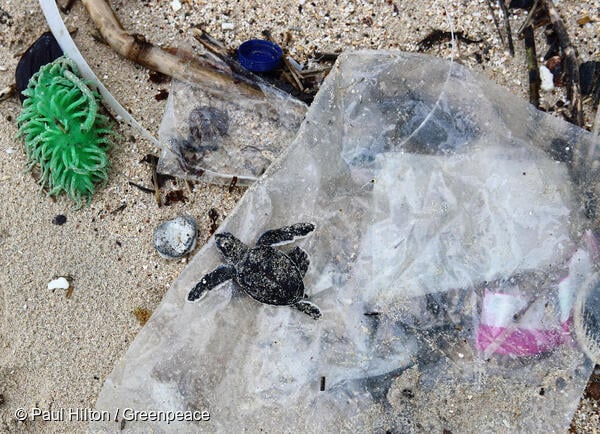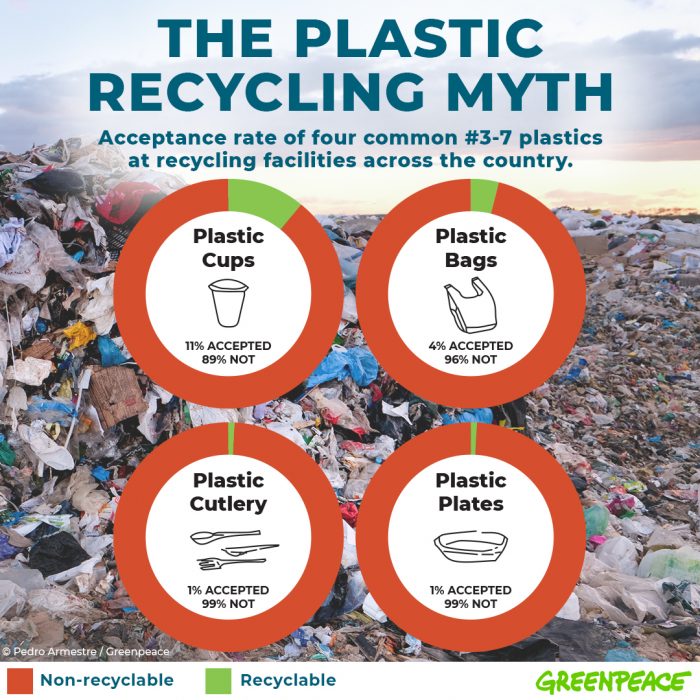
All examples provided in this report are for the purpose of illustrating the type of changes needed in retail, foodservice, and consumer goods worldwide. Greenpeace USA does not endorse any of the products, brands, or companies listed in this report. The information in this report is accurate as of August 25, 2020.
[i] Greenpeace Inc. is a registered Internal Revenue Service 501(c)(4) nonprofit entity that operates in the United States of America.
Introduction
The COVID-19 pandemic has reshaped how people think about health and safety. In response, people around the world have stocked up on soaps, sanitizers, and disinfectant sprays, distanced themselves from friends and family, and limited trips to stores and restaurants. And in response to worker and customer concerns and an onslaught of plastic industry propaganda, plastic bans have been paused and reusables have been restricted in many locations.[1]
As retail establishments and restaurants reopen, and as COVID-19 cases continue to rise, it is imperative that reuse and refill systems are implemented that both protect our environment and alleviate any worker and customer concerns. The pandemic cannot be an excuse to move back to an era of widespread disposables, as our environment and the world’s most vulnerable communities will suffer most. The plastics industry continues to fight to ensure single-use plastics are prevalent into the future;[2] however, its lobbying ignores the impacts of refineries and incinerators on low-income communities and people of color and the cost of increased plastic pollution to our oceans and increasingly impacted communities around the world.
Thankfully, communities and businesses worldwide have started building reuse and refill systems that protect our environment and impacted communities, while also ensuring that sanitization programs instill confidence in reusables for shoppers and workers alike.[3] [4] [5] [6] [7] The climate crisis, fueled in part by plastic production, is not slowing down. Businesses and governments must continue to think creatively and invest in robust reuse and refill systems. The pandemic cannot be an excuse for businesses or governments to maintain the status quo and continue to exacerbate the plastic pollution and climate crises. It is time to turn the page toward something better.
Over the last few years, the plastic pollution crisis has entered the forefront of people’s minds. Images of beaches filled with plastic, videos of animals choking on straws and bags, and growing awareness about the ocean gyres helped to create a new generation of anti-plastic activists.
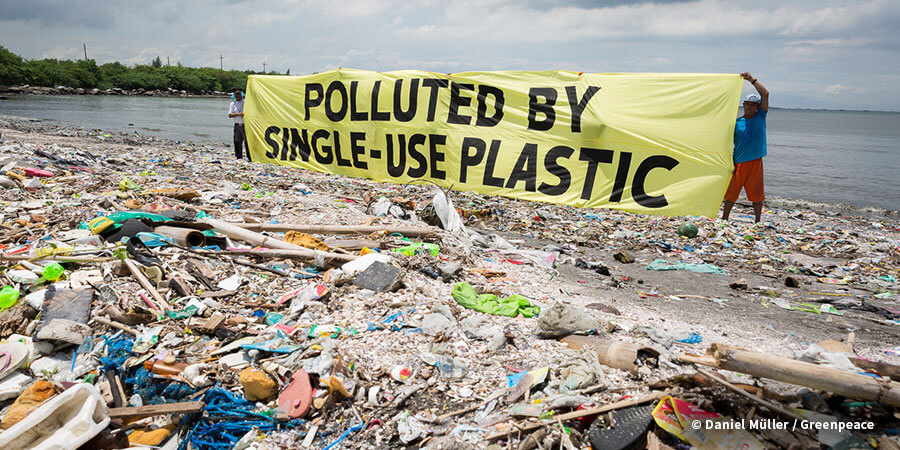
As that outrage continues to grow over the dangers of plastic, people have increasingly connected the dots to the fossil fuel industry.[8] [9]
The same companies that are destroying our climate are rapidly expanding petrochemical facilities to increase profits from single-use plastics and exploiting low-income and Black and Brown communities.[10] [11]
It is time to stop treating people and the planet as disposable.[12] To save our climate and ensure healthy communities for everyone, we must end our reliance on cheap throwaway plastics.
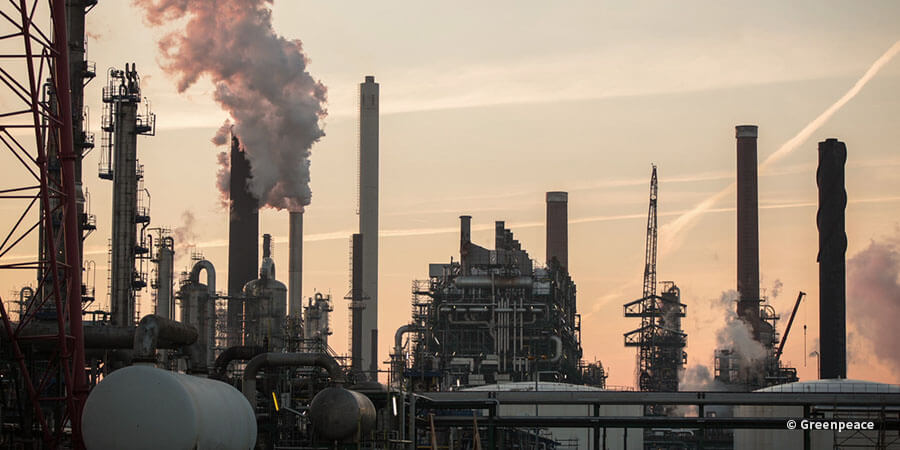
Before the pandemic, cities, states, and countries were increasingly moving to ban unnecessary single-use plastics, recognizing the toll that this polluting industry has had on people and our environment. While many of those bans remain in place, particularly internationally, in the U.S. it has been a different story.
In a widespread PR push, the plastics industry misrepresented older, industry-funded studies to claim that reusables are more dangerous than disposable plastic, influencing decision-makers and leading to some governments pausing plastic bans.[13] Many local and state governments have said publicly that these moves will be temporary, and some states are reinstating previous, or moving forward with new, plastics bans (e.g., California, Massachusetts, Vermont).[14] [15] [16] But the plastics industry has worked to ban plastic bans with preemption legislation for years, and will fight to keep them in place following the pandemic.[17] [18]
According to the U.S. Centers for Disease Control and Prevention (CDC), “it may be possible that a person can get COVID-19 by touching a surface or object that has the virus on it and then touching their own mouth, nose, or possibly their eyes,”[19] but “transmission of novel coronavirus to persons from surfaces contaminated with the virus has not been documented.”[20] In a grocery store full of people, or other operations such as foodservice, disposable plastics are not inherently safer than reusables.[21]
We must do everything possible to alleviate concerns of retail and food workers during the pandemic, many of whom are working without adequate protections or benefits while putting their lives on the line. Retail and food workers deserve better, and should feel safe and be protected. Out of an abundance of caution for workers, occupational safety experts have encouraged people to bag their own groceries and handle their own reusables.[22] And most approved household disinfectants have proven effective at eliminating the virus from hard surfaces, including reusables.[23] [24] It is incumbent upon all of us to wear a mask, keep our distance from others, and employ good hygiene to keep ourselves and everyone else safe.
What is good for our environment can and must also be good for workers, and these are the solutions we need to embrace. In the middle of a pandemic, we should not need to throw out the progress that has been made on protecting the environment and vulnerable communities from plastic pollution. Reuse and refill systems can instill confidence in the safety and cleanliness of products. Businesses, policymakers, the press, and scientists have an opportunity to demonstrate how existing sanitization protocols, and any modifications to reusable applications, are helping keep workers and customers safe. All over the world, these systems are already working. Some companies like Loop have even reported seeing sales increases during the pandemic.[25]
We cannot turn back the clock to an era of polluting single-use plastics. Now is the time to reassure customers that reuse and refill systems can be used safely in a time of uncertainty. The following examples illustrate that reuse and refill systems can work in our new reality and should provide a model to build off of. If governments require or businesses turn to widespread disposables, the world will face more plastic pollution, increased forest destruction, and worsened climate change, and the exploitation and harm to communities on the frontlines of fossil fuel extraction, petrochemical and plastic production, and plastics incineration and landfilling will continue. Reuse and refill systems, when implemented correctly, can keep people safe and help to end our throwaway culture. Companies and governments must continue to move forward, not slip back toward throwaway models from before the pandemic that harm current and future generations.
Trust science and sanitization
The U.S. and world are at a turning point, as COVID-19 cases continue to increase and some governments have offered nonsensical and dangerous responses to the pandemic (e.g., reopening businesses too soon,[26] politicizing public health measures like wearing a mask[27]). There is a risk that this same disregard for science will dissuade action on the public health and environmental impacts of single-use plastics.
Adherence to science and public health recommendations is not and should never be a political action or weaponized by exploitative politicians or corporations during a pandemic.
Adherence to science is common sense and will help protect our global society and current and future generations.
Recent research shows that COVID-19 lives the longest on plastic and stainless steel surfaces.[28] [29] With so much disposable plastic being doled out in retail and food businesses nationwide, the argument from industry lobbyists that single-use is safer just doesn’t hold up. On June 22, Greenpeace USA and UPSTREAM released a letter now signed by 130 public health and medical experts from 20 countries agreeing that reusables can be used safely during the pandemic by employing basic hygiene and contactless systems.[30]
Retailers, foodservice operators, and consumer goods companies already have strict sanitization protocols to maintain proper hygiene and prioritize food safety, including those employing reuse and refill systems. On a recent webinar about reuse during the pandemic, TerraCycle and Loop CEO Tom Szaky said, “We are inherently swimming in reuse.” He noted that people already trust dentists and the medical industry to sanitize medical equipment before it is reused.[31] That same trust is and must continue to be bestowed on companies and restaurants to sanitize reusables, and businesses and governments have a role in educating the public about the safety of reuse.
While an abundance of caution is necessary to protect people from COVID-19, we cannot allow the greedy, opportunistic, dangerous plastics and fossil fuel industries to exploit a pandemic for financial gain by promoting disposable plastic packaging when reuse is a present and viable alternative.
Reusable systems already exist, and are growing
Reuse isn’t a new idea. Before the surge of throwaway plastics that began in the mid-twentieth century, reusable bottles and containers were a key component of everyday life. As concerns grow about the impacts of throwaway plastics (and other single-use materials) on communities and our planet, reuse is seeing a resurgence globally, from savvy entrepreneurs to major global brands.
There are four basic reuse models: refill at home, refill on the go, return from home, and return on the go. The following graphics are based on the Ellen MacArthur Foundation report: Reuse — Rethinking Packaging.[32] The examples of reuse are also from this report.
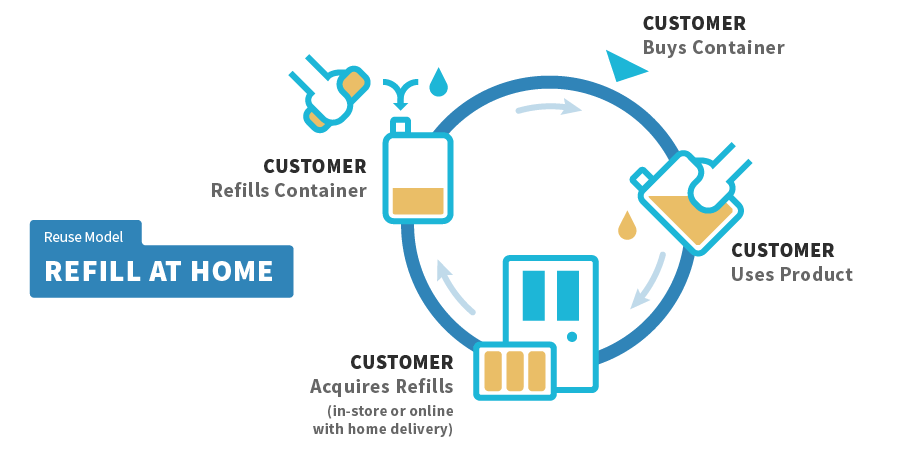
Examples of refill at home:
- E-commerce for compact refill products that are used at home or in office buildings on a regular basis (e.g. beverages, home care, personal care).
- Traditional retail outlets for standard-sized, non-compact refill products (e.g., home care, personal care).
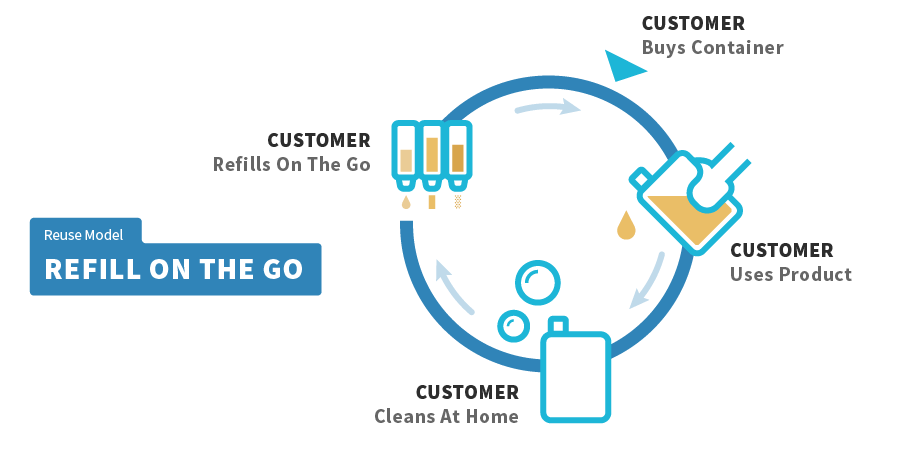
Examples of refill on the go:
- Traditional retail outlets for products like beverages, cooking essentials (e.g., grains, flours, oils), personal care, and home care.
- Cities for coffee-to-go or water fountains.
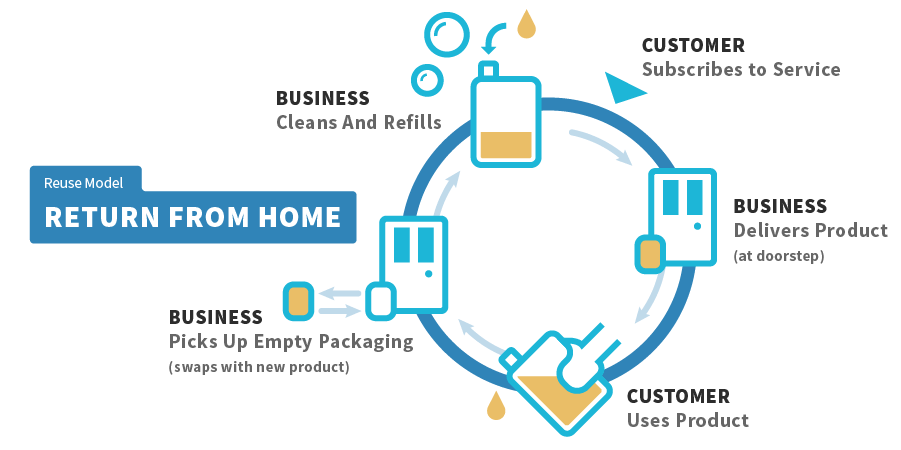
Examples of return from home:
- E-commerce for products such as groceries, meal delivery, personal care, home care, and skin care.
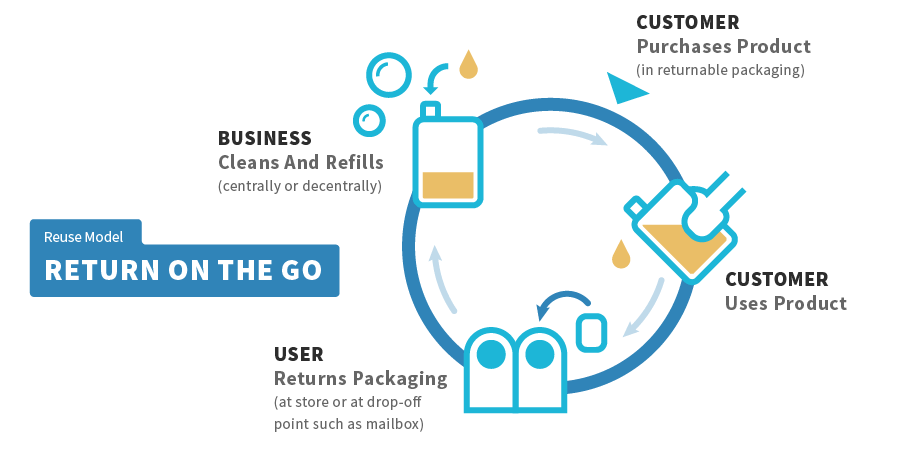
Examples of return on the go:
- Traditional retail outlets for beverages where the model has been proven to work at scale in several geographies (e.g., Latin America, Japan, Europe).
- Cities and events for products on-the-go such as takeaway coffee, beverages, and food.
The Ellen MacArthur Foundation notes six benefits of reuse for businesses: cut costs, adapt to individual needs, optimize operations, build brand loyalty, improve user experience, and gather intelligence on user preferences and system performance.[33] A new wave of innovative reuse and refill systems already exists, and some are seeing growth even amid a pandemic. Many organizations—including the Ellen MacArthur Foundation,[34] Greenpeace,[35] Oceana,[36] Oceanic Global,[37] Post Landfill Action Network,[38] [39] ReThink Disposable,[40] the Surfrider Foundation,[41] and UPSTREAM[42]—have documented myriad examples of reuse systems and their benefits.
While businesses must invest significantly more into reuse and refill systems, some are finally getting involved and systems are scaling up. Loop, launched in 2019, is perhaps one of the best known.[43] The company ships products to customers in reusable packaging and containers that are then returned, cleaned, and refilled, and is expanding throughout the U.S. and into global markets, working with big brands from Kroger to Walgreens, Tesco, Unilever, and Procter & Gamble. Loop,[44] like other third-party reuse businesses to foodservice operators and retailers, adheres to regulations based on FDA guidelines for sanitization,[45] which ensure the safety of reuse systems for workers and customers. Algramo, which uses both vending machines and delivery models for refill, has expanded markedly in Chile.[46] [47] In the U.S., Ecopod offers a similar vending machine refill format for personal care and cleaning products.[48] Even Nestlé, a laggard in many ways in response to the global movement to break free from plastic,[49] has begun piloting reuse and refill operations with vendors like Algramo, Loop, and MIWA.[50] However, the plastic pollution crisis requires so much more than pilots. Large consumer goods companies, from Nestlé to Unilever, Coca-Cola, and PepsiCo, must urgently act to ramp up reuse and refill systems and ditch single-use packaging.
Governments and businesses should learn from the existing infrastructure of successful reuse programs, such as Dabbawalas: For 130 years, this reusable food delivery system for lunches has worked in India. Startups such as The Wally Shop in the U.S.,[51] inspired by Dabbawalas,[52] are bringing a reuse model to new markets with an emphasis on groceries.
Many to-go reuse models are for cups and/or containers, such as CupClub,[53] Vessel,[54] and Muuse,[55] which can be used at participating vendors. Customers pay for the cup or container with a deposit and return it after use for a clean one. This obviates the need for disposables and prioritizes sanitization.
And while third-party services with sanitization systems may seem like the only option amid a pandemic, bringing your own cups and containers is still a viable choice with the proper contactless protocols (e.g., City to Sea,[56] Plastic Free Places,[57] Takeaway Throwaways[58]). In 2019, California amended its Retail Food Code with protocols for businesses to safely fill customers’ reusable food and beverage containers, emphasizing contactless refill methods.[59] As several businesses employing these systems adapt to address concerns of their workers and customers, larger companies should develop similar contactless protocols for reuse and refill that prioritize safety with bring-your-own container models. Some large corporations are starting to. On August 7, Starbucks reinstated reusable cups in its Europe, Middle East, and Africa markets—it must now do the same in the U.S. and throughout its worldwide operations.[60]
Drawing from a wealth of public health and business guidance, NGOs Post Landfill Action Network,[61] [62] Oceanic Global,[63] the Surfrider Foundation,[64] and UPSTREAM[65] recently released reopening guidelines, which prioritize sanitization and best practices to ensure health and safety while also prioritizing reuse systems. They note that some governments have officially promoted reusables during the pandemic. In Singapore, government officials have encouraged customers to bring their own containers, recognizing the massive environmental and public health risks of a surge in disposable plastics.[66] The government of Victoria, Australia, states there “is currently no evidence to suggest there is any benefit to switching to disposables.”[67] And some government entities and trade groups offer contradicting advice in response to the pandemic: In the U.S., the CDC[68] and the National Restaurant Association[69] lead with a recommendation to use disposables; however, they also acknowledge that reusables are an option with proper sanitization.
Bulk food is another simple, cost-effective way to minimize packaging and promote reuse. Many smaller grocers are continuing to offer bulk food sections, and some customers and reporters are asking questions about their safety.[70] As noted earlier, with proper hygiene (e.g., washing hands, disinfecting surfaces) workers and customers can reduce the risk of COVID-19 transmission. Gravity-fed dispensers (which already exist to some degree in many U.S. retail locations such as Whole Foods and WinCo Foods) ensure customers cannot reach into the dispenser. For those looking to innovate bulk food sections, there are new models like MIWA, a third-party refill system that provides smart-enabled containers for customers,[71] who can then take the containers home and reuse at in-store kiosks.
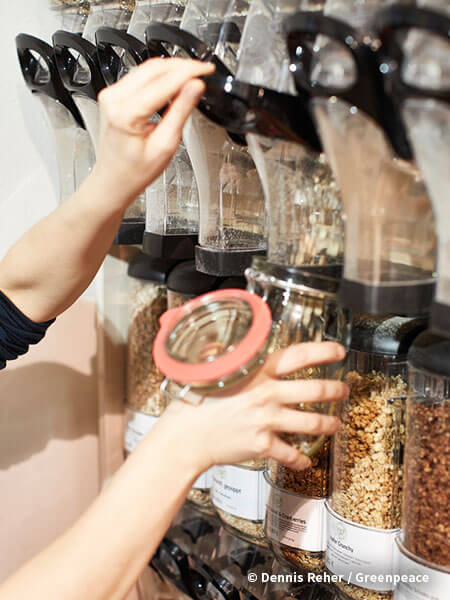
New reuse opportunities for foodservice and resale
The foodservice industry has undergone significant changes in response to COVID-19. Many restaurants have shifted to pickup or to-go orders only. And some institutional foodservice operators are shifting to providing meals in pre-packaged containers or delivered by robots, rather than in cafeteria lines or walk-up service counters in dining halls.[72] These modified operations ensure social distancing and protect both workers preparing and serving meals, and customers. However, along with these changes, many foodservice operators have opted for disposable packaging, which is fueling the plastic pollution crisis, rather than shifting toward reusables.[73] [74] In response, nearly 130 organizations and thousands of people are calling for less plastic from food delivery services like DoorDash and Grubhub.[75]
Alternatives exist. San Francisco-based Dispatch Goods works with local businesses that provide their to-go meals in reusable containers. Customers pick up their meals in reusable stainless steel containers from the restaurant; when they are finished, they notify Dispatch Goods, which collects the containers from customers and washes them for the next use at a participating business.[76] Placing advanced orders with local restaurants helps provide business to operators who can plan for the number of meals to make and staff hours needed, given significant layoffs industry-wide.[77] Foodservice operators could also use models like Fresh Bowl, which provides prepared meals in reusable glass jars provided with a small deposit that customers purchase via vending machines.[78] In addition to eliminating disposable containers for to-go meals, it builds brand loyalty when customers return their container for cleaning and either receive a deposit refund or use that money for their next meal purchase.
There are many resources and protocols for contactless systems for menus, payment, reuse, and refill. In the UK, City to Sea provides guidance for businesses to safely refill a customer’s cup (the graphic below is based on the City to Sea model);[79] in Australia, Plastic Free Places provides guidelines for reusable to-go containers and bags;[80] and in New Zealand, the Takeaway Throwaways campaign offers examples of contactless systems and vendors employing reuse.[81]



During the pandemic, some retailers like Costco and Kroger have permitted customers to bring in reusable bags, unless prohibited by local or state mandates, and many retailers that permit reusable bags ask customers to bag items themselves. Regional grocery retailers like MOM’s Organic Market are keeping their bulk sections open, where customers can bring their own clean containers for a variety of products.[82]
Walmart, the world’s largest retailer, is investing billions of dollars for in-store and online innovations of its Canadian operations[83] and, in the U.S., is rolling out Walmart+, an online delivery service that will compete with Amazon.[84] But Walmart has yet to demonstrate the same level of investment in reuse and refill necessary to markedly reduce its enormous single-use plastic footprint. As more customers opt for grocery delivery or curbside pickup, retailers are seeing marked growth in revenues due to increased spending amid the pandemic[85] [86] and are launching new initiatives. Walmart and other large retailers clearly have the resources and must reduce their single-use plastic (and other single-use material) footprints by investing in reuse and refill and packaging-free delivery systems. Several models are already available, through a growing number of startups (e.g., Loop,[87] The Wally Shop,[88] Zero[89]).
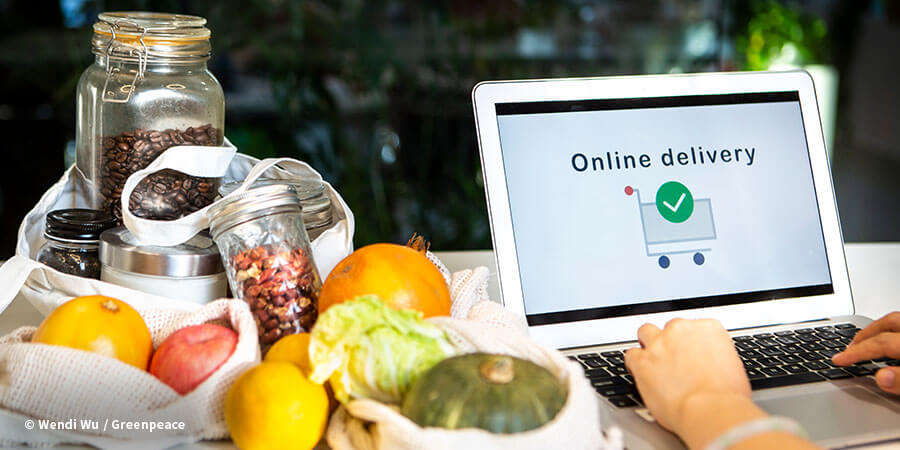
Demand environmental justice and good jobs
With more than 2,000 organizations and growing, the global Break Free From Plastic movement[90] has been making waves among governments, businesses, and the public. Millions of people are demanding an end to single-use plastics, businesses and governments are beginning to phase out single-use plastics, tens of thousands of news stories are appearing every year about plastic pollution, and in 2018, single-use was named the word of the year.[91]
The plastics and fossil fuel industries know that their time of pushing toxic, throwaway plastics on communities and the planet is coming to an end. As more businesses reopen and the threat of more COVID-19 cases continues, we also face the persistent threats of the plastic pollution crisis and climate change, neither of which will resolve themselves without marked action from governments, businesses, and civil society. Another significant threat is massive economic hardships from COVID-19, which will continue to put workers, families, and communities at risk. These crises are connected, and the impacts on all of us are exacerbated by corporate greed.
This is a moment to say NO to plastics and fossil fuel corporate giants, and YES to a just, clean, sustainable future that provides good-paying union jobs and the services communities need to thrive.
While globally the scale of reuse and refill systems is far too small to currently offset the tidal wave of single-use packaging, the great news is there are examples of scaled or scalable technologies that, with the proper investments and consistent standards, will become the new norm for product delivery. And while we need to improve broken recycling and waste management systems, the public and lawmakers are no longer accepting the decades-old greenwashing tactics companies have used (e.g., claiming that recycling is the answer)[92] to avoid taking responsibility for their contribution to the plastic pollution crisis.[93] Thus, it is imperative that companies invest significantly in reuse and refill and cross-sector collaboration, to create the reuse and refill systems of the future that put people and the planet first.
Communities and workers deserve safe, affordable, and accessible reuse and refill systems that avoid destructive throwaway packaging, as outlined by Break Free From Plastic’s Just Recovery Principles.[94]

The Ellen MacArthur Foundation estimates at least a $10 billion economic opportunity by replacing just 20% of single-use plastic packaging with reusable alternatives.[95] Given the scale of this opportunity, reusable systems must invest in local economies, creating good union jobs in several sectors (e.g., manufacturing, distribution, retail, foodservice, food delivery). As innovations in reuse and refill continue, workers must be part of the equation. Amid the pandemic, companies may be saving money from layoffs or shifting to contactless services, or finding new revenue streams, particularly in retail as more people buy in bulk and prepare their own meals. Companies must develop transition plans that maintain jobs and apply cost savings and profits from any modified operations to pay living wages and benefits to their frontline workers.
Far too many corporate giants in retail, foodservice, and other sectors have feigned concern for workers providing essential services with feel-good PR campaigns and small, short-lived pay bumps that have been revoked in some cases after certain periods of time.[96] [97] Retail behemoths like Walmart and Amazon have inconsistently reported COVID-19 cases, leading workers to track cases themselves,[98] [99] [100] and to document and demand action from Walmart via an exempt solicitation filed by United for Respect and Majority Action.[101] And some, such as Amazon, have even fired workers who organized to speak out about the health and death risks warehouse workers face during COVID-19.[102] [103] [104]
Workers responsible for the production, preparation, and distribution of the food and products used every day are essential, and they require more than savvy talking points from corporate PR experts. Premium wages, health and safety protections (e.g., see UFCW,[105] Teamsters,[106] UNITE HERE[107]), universal paid sick leave and family and medical leave, hazard pay, childcare, and protections for collective bargaining agreements are some of the benefits each of these workers needs immediately.
In addition to necessary changes within their own companies, business leaders must support efforts in Congress for an Essential Worker Bill of Rights.[108] [109]
Even though some forms of expanded use of PPE are obviously necessary in light of the COVID-19 pandemic, our society has an obligation to grapple with the impacts of increased plastic production and disposal, especially as they land hardest on low-income and Black and Brown communities. The pandemic has led to a surge of demand for some single-use plastics like grocery bags and PPE, as well as new applications of other plastics like protective shields at retail locations. Despite these short-term surges in demand, overall the global plastics and petrochemical industries are seeing reduced demand. The oil industry has been in massive decline, exacerbated by the pandemic, an oil price war, increased market share of renewables, institutional divestment from the oil and gas sectors amid massive debt, and concerns about plastic pollution.[110] And despite major growth plans and investments in a global petrochemical buildout, uncertainty remains.[111]
What is certain is the continued environmental and public health impacts of petrochemical facilities (existing and those being built) and of fossil fuel extraction and plastics disposal from incinerators to landfills,[112] [113] not to mention the marked increase in plastic pollution from single-use PPE[114] [115] [116] and the health and climate impacts of incinerating PPE.[117] Low-income and Black and Brown communities, like those living in Cancer Alley[118] or Death Alley,[119] including St. James Parish and Mossville, Louisiana, and the Houston petrochemical corridor, continue to face the worst impacts of these extractive industries,[120] [121] and are at the same time disproportionately impacted by COVID-19.[122] [123] [124] This must change.
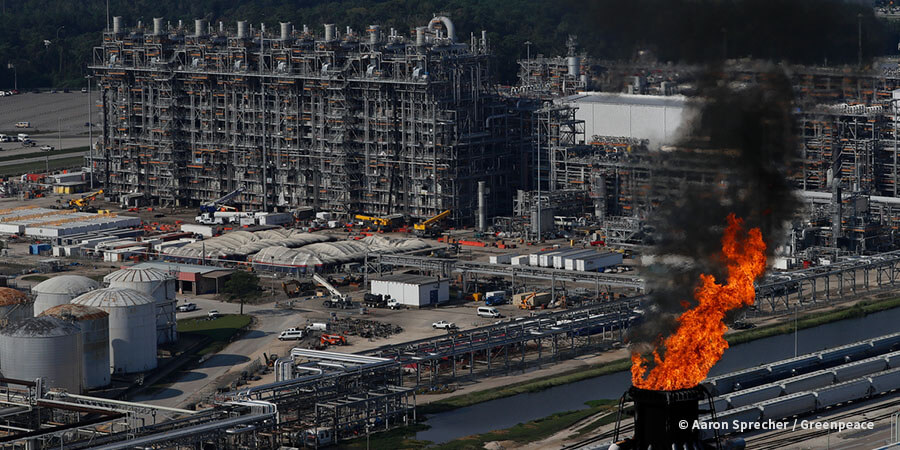
If governments and businesses are truly serious about reviving the economy, protecting communities, and giving our planet a fighting chance to heal from the plastic pollution crisis and existential dangers of climate change, investing in and markedly expanding reuse and refill systems will help eliminate throwaway packaging and can create new union jobs.
They must also support low-income communities and communities of color that have been exploited by the fossil fuel and plastics industries. Reuse systems must be accessible and affordable, especially for customers and businesses in low-income communities. And reusable containers must be made from safer materials and avoid toxic plastics (e.g., PVC, polystyrene, polycarbonate which can leach bisphenol A)[125] [126] [127] and toxic additives and contaminants that may be present (e.g., flame retardants in recycled plastics,[128] lead in glass[129] and ceramics[130]).

Conclusion: We still need to eliminate single-use plastics
A pandemic has transformed life as we know it. More and more, we are learning how the old ways of life were unsustainable and now untenable in a new era. For the health of our communities and the future of our planet, we need investments that will better our society, not perpetuate harm onto others for the sake of corporate profits. Despite exploitative pushes from plastics and fossil fuel industry players to try and sell us on the value of disposable plastic bags and packaging during the pandemic, the writing is on the wall. The time of unnecessary plastics is over. People want an end to the plastic pollution crisis: They want clean air, water, and food, livable communities, economic opportunities, and a future for their families and grandchildren where the planet is habitable, not cooked and filled with plastics instead of soil.
Climate change, fueled in part by the production of throwaway plastics,[131] is still threatening communities today, and our future. We cannot delay bold action. In the U.S., as states reopen, some leaders are making wise decisions. California resumed its ban on single-use plastic bags on June 22;[132] Vermont moved forward with its planned plastic bag ban, effective July 1;[133] Massachusetts rescinded its order that had prohibited reusable bags on July 10;[134] and New Hampshire began allowing reusable bags again on July 27,[135] but has yet to ban single-use plastic bags. We now need other states that have delayed approval or implementation of, or that have rescinded, their single-use plastics bans to follow California’s and Vermont’s lead; states such as Maine, New Hampshire, New Jersey, and New York.
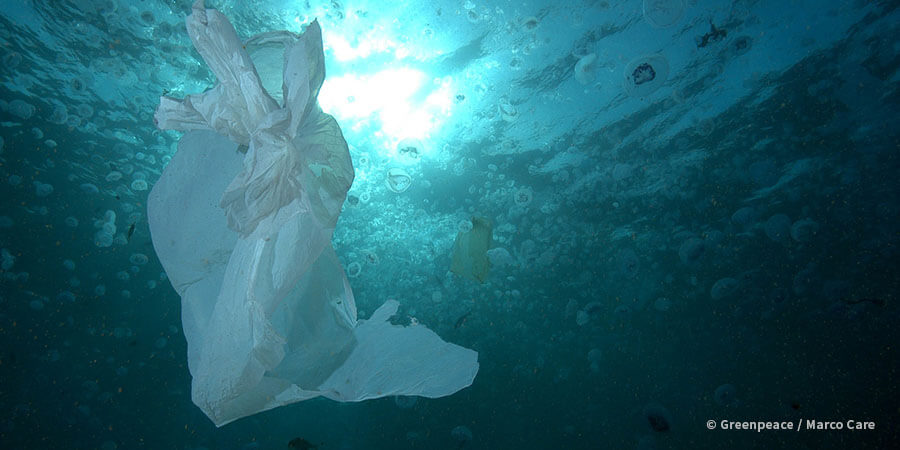
Globally, some cities and countries have continued to push for action on the plastic pollution crisis, even during the pandemic. Jakarta enacted a single-use plastic bag ban on July 1,[136] making it the largest city in Southeast Asia to do so. Germany, in compliance with an EU directive, also recently announced a ban on several types of single-use plastics to take effect in July 2021.[137] And businesses are taking action: In June 2020, South Korea retailer Lotte Mart announced it will cut its plastic use by 50% by 2025,[138] and in July ALDI UK & Ireland also committed to reduce its plastic packaging by 50% by 2025.[139] These announcements follow Giant Eagle’s historic commitment in December 2019, making it the first large U.S. retailer to commit to eliminate all single-use plastics from its operations by 2025.[140] However, all retailers, including ALDI which supports a group lobbying against reuse in some European countries,[141] must invest in and embrace reuse and refill systems rather than switch from one single-use material to another.
As businesses and governments continue to adapt their operations in response to COVID-19, they cannot delay action as multiple environmental crises continue to rage on, pandemic or no pandemic. Plastic is literally raining down from the sky.[142] How companies and governments respond or fail to respond will impact communities and our planet for generations to come.
Things have changed significantly, and we need to retool some of the solutions and approaches to eliminating single-use plastics. Sanitization is a priority, especially in the midst of a pandemic. Reusable systems are viable options to help transition us away from disposable plastics. Even with the new challenges presented by COVID-19, it is clear that solutions already exist. With investment and attention from governments and businesses worldwide, we can scale up reuse systems—a move that will benefit both the economy and our planet, and does not come at the expense of communities, but rather supports them.
Many startups and even large retailers and consumer goods companies are aware of the promise and opportunity for reuse. Those companies that fail to seize this opportunity will miss the economic benefits of shifting to reuse, and furthermore run the risk of becoming obsolete as others gain market share by providing services to customers without the need for disposable packaging. The window of opportunity to be a part of the new wave of innovations and investments will eventually close.
Businesses and governments must double down on their efforts to reduce plastic pollution. Corporations must eliminate single-use plastics and all disposable packaging while investing in existing and new reuse systems; governments must ban single-use plastics, incentivize reuse, and hold corporations accountable for failing to take responsibility for their contribution to the plastic pollution crisis; and customers can help support reuse and refill systems whenever they have the choice to do so.
As the world continues to transform amid the pandemic, we have an opportunity to work together to rebuild a new, just future for our children and communities, and a livable planet.
It is time for leadership from governments and businesses to imagine and launch with great expediency the reuse systems of the future. The good news is they don’t have to start from scratch. Rather than investing in failed programs—or, even worse, false solutions[143]—this is a moment to join a growing movement for a plastic-free future and a reuse revolution.
We can work together to invest in technologies and systems that provide good union jobs, protect our planet, and provide customers and communities with the services they need. It requires embracing change, transforming existing systems, and time and investment. But if nothing else, 2020 has shown so far that in moments of challenge and uncertainty, marked changes are possible and are becoming inevitable. That is what’s required of elected officials and business leaders today. Increasingly, the public will not tolerate excuses, greenwashing, or delays. Governments and businesses must lead, invest in our future, and be accountable to the people in their efforts to make life better for us all.
Now, it’s time to act.
Endnotes
5. https://oceanic.global/wp-content/uploads/2020/07/Oceanic-Global-COVID-19-Reopening-Guidelines.pdf
6. https://www.surfrider.org/coastal-blog/entry/how-to-reopen-restaurants-while-safely-using-reusables
8. https://time.com/5766188/shell-oil-companies-fossil-fuels-climate-change
9. https://grist.org/climate/fossil-fuel-companies-are-counting-on-plastics-to-save-them
10. https://www.ciel.org/plasticandclimate
11. https://www.ciel.org/plasticandhealth
12. https://www.sierraclub.org/sierra/racism-killing-planet
17. https://theintercept.com/2019/07/20/plastics-industry-plastic-recycling
19. https://www.cdc.gov/media/releases/2020/s0522-cdc-updates-covid-transmission.html
20. https://www.cdc.gov/coronavirus/2019-ncov/prevent-getting-sick/cleaning-disinfection.html
22. https://www.dir.ca.gov/dosh/Coronavirus/COVID-19-Infection-Prevention-in-Grocery-Stores.pdf
23. https://www.cdc.gov/coronavirus/2019-ncov/community/reopen-guidance.html
26. https://www.healthline.com/health-news/covid19-cases-rising-states-reopened
28. https://www.nejm.org/doi/full/10.1056/NEJMc2004973
29. https://www.thelancet.com/journals/lanmic/article/PIIS2666-5247(20)30003-3/fulltext
31. https://www.youtube.com/watch?v=xKGDRAwIxPw
32. https://www.ellenmacarthurfoundation.org/publications/reuse
33. https://www.ellenmacarthurfoundation.org/publications/reuse
34. https://www.ellenmacarthurfoundation.org/publications/reuse
35. https://prod.greenpeaceusa.info/usa/research/report-the-smart-supermarket
36. https://oceana.org/publications/reports/just-one-word-refillables
37. https://oceanic.global/wp-content/uploads/2020/07/Oceanic-Global-COVID-19-Reopening-Guidelines.pdf
39. https://docs.google.com/document/d/190BlhgWK-OF3GJ248j5uTEjmBu3BO0lC-siWA4d3DfQ/edit
40. https://www.rethinkdisposable.org/resources
41. https://www.surfrider.org/coastal-blog/entry/how-to-reopen-restaurants-while-safely-using-reusables
42. https://www.youtube.com/watch?v=xKGDRAwIxPw
44. https://loopstore.com/cleaning
45. https://www.fda.gov/food/retail-food-protection/fda-food-code
46. https://algramo.com/en/home
48. http://ecopod.us
56. https://www.citytosea.org.uk/contactless-coffee
57. https://www.plasticfreeplaces.org/post/cafe-guide-to-reusables-coronavirus
58. https://takeawaythrowaways.nz/blog/nzs-guide-to-reuseable-serviceware-under-alert-level-2
59. https://leginfo.legislature.ca.gov/faces/billTextClient.xhtml?bill_id=201920200AB619
62. https://docs.google.com/document/d/190BlhgWK-OF3GJ248j5uTEjmBu3BO0lC-siWA4d3DfQ/edit
63. https://oceanic.global/wp-content/uploads/2020/07/Oceanic-Global-COVID-19-Reopening-Guidelines.pdf
64. https://www.surfrider.org/coastal-blog/entry/how-to-reopen-restaurants-while-safely-using-reusables
69. https://restaurant.org/downloads/pdfs/business/covid19-reopen-guidance.pdf
70. https://thecounter.org/covid-19-coronavirus-bulk-aisle-health-grocery-beans-rice
71. Third-party reuse systems often employ RFID, NFC, or QR technologies on the containers to sync with payment apps, and provide data such as product information and insights on consumer behavior.
72. https://www.nytimes.com/2020/07/13/dining/college-food-coronavirus.html
73. https://www.smithsonianmag.com/science-nature/single-use-plastic-covid-180975312
75. https://beyondplastics.org/article/holdtheplastic
76. https://dispatchgoods.earth
77. https://www.youtube.com/watch?v=xKGDRAwIxPw
78. https://www.myfreshbowl.com
79. https://www.citytosea.org.uk/contactless-coffee
80. https://www.plasticfreeplaces.org/post/cafe-guide-to-reusables-coronavirus
81. https://takeawaythrowaways.nz/blog/nzs-guide-to-reuseable-serviceware-under-alert-level-2
82. https://momsorganicmarket.com/bulk
83. https://www.supermarketnews.com/retail-financial/walmart-canada-unveils-35-billion-expansion-plan
84. https://www.techradar.com/news/walmart-plus
90. https://www.breakfreefromplastic.org
93. https://theintercept.com/2019/07/20/plastics-industry-plastic-recycling
94. https://www.breakfreefromplastic.org/just-recovery-principles
95. https://www.ellenmacarthurfoundation.org/publications/reuse
96. https://www.nytimes.com/2020/07/14/business/coronavirus-essential-workers-pay-raises.html
100. https://areyousafe.work/walmart
101. https://d18rn0p25nwr6d.cloudfront.net/CIK-0000104169/dcdb6773-d4b2-49ca-9323-775005deb637.pdf
103. https://nymag.com/intelligencer/2020/04/protesting-workers-are-trying-to-save-lives.html
105. http://www.ufcw.org/coronavirus/shopsmart
106. https://teamster.org/covid-19/best-practice-policies-covid-19-food-supply-emergency
107. https://unitehere.org/wp-content/uploads/public-health-guidelines.pdf
110. https://www.ciel.org/reports/pandemic-crisis-systemic-decline
111. https://www.ciel.org/reports/pandemic-crisis-systemic-decline
112. https://www.ciel.org/plasticandclimate
113. https://www.ciel.org/plasticandhealth
115. https://www.weforum.org/agenda/2020/06/ppe-masks-gloves-coronavirus-ocean-pollution
116. https://www.cnn.com/2020/04/21/us/coronavirus-ppe-masks-gloves-environment-hazard-trnd/index.html
117. https://noharm-global.org/documents/health-care-waste-management-corona-virus-update
118. https://www.propublica.org/article/welcome-to-cancer-alley-where-toxic-air-is-about-to-get-worse
119. https://www.enddeathalley.org
120. https://www.ciel.org/plasticandhealth
121. https://www.sierraclub.org/sierra/racism-killing-planet
122. https://www.theguardian.com/world/2020/may/20/black-americans-death-rate-covid-19-coronavirus
123. https://www.statnews.com/2020/06/09/systemic-racism-black-health-disparities
124. https://www.cdc.gov/coronavirus/2019-ncov/need-extra-precautions/racial-ethnic-minorities.html
125. https://saferchemicals.org/2020/08/10/how-retailers-can-stop-packaging-food-with-forever-chemicals
126. https://chemtrust.org/bisphenol_group
127. https://www.surfrider.org/coastal-blog/entry/choose-reusables-to-avoid-consuming-chemicals
129. https://www.canr.msu.edu/news/watch_out_for_kitchenware_that_could_chemically_contaminate_your_food
130. https://www.cdph.ca.gov/Programs/CCDPHP/DEODC/CLPPB/Pages/Q-A-Lead-in-Tableware.aspx#howimportant
131. https://www.ciel.org/plasticandclimate
135. https://www.nhpr.org/post/sununu-lifts-nhs-ban-reusable-bags-during-pandemic#stream/0
137. https://www.dw.com/en/germany-bans-single-use-plastic-products/a-53932107
138. https://www.bnnbloomberg.ca/south-korea-s-lotte-mart-to-cut-single-use-plastic-50-by-2025-1.1447085
139. https://www.edie.net/news/5/Aldi-to-halve-plastic-packaging-use-in-the-UK-by-2025
141. ALDI Nord and ALDI Süd are among several corporate members of BGVZ, a large lobby group which promotes single-use instead of reuse in Germany and on the EU-level. Other large brands like Nestlé Waters, PepsiCo Deutschland, Ball, and Lidl are part of this lobby group. For more, visit: https://www.bgvz.de/bgvz; https://www.welt.de/wirtschaft/article206345149/Einweglobby-um-Red-Bull-Pepsi-Aldi-und-Lidl-geht-auf-die-Barrikaden.html; https://lobbyfacts.eu/representative/51755652e1e64b1a9011b84f215c5848/bund-getrnkeverpackungen-der-zukunft-gbr.
142. https://www.ecowatch.com/plastic-rain-national-parks-2646170740.html

